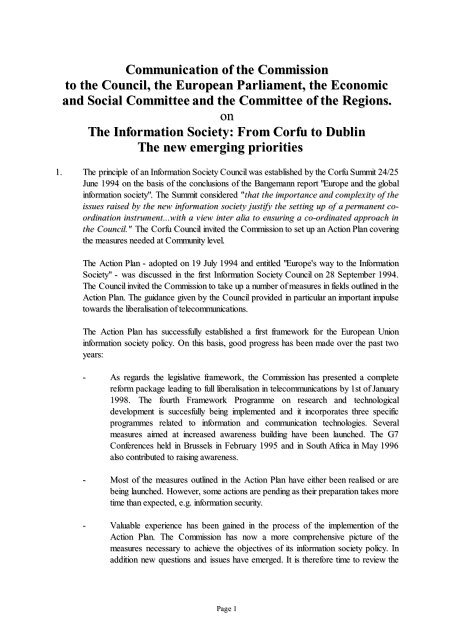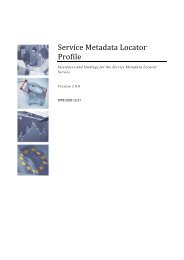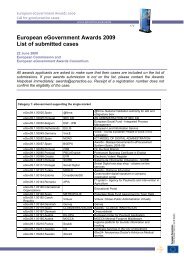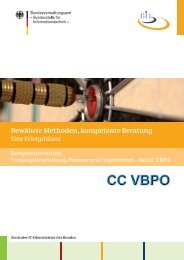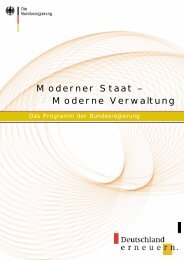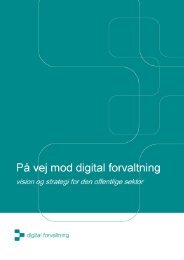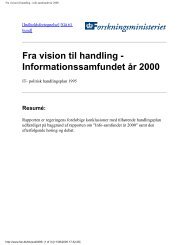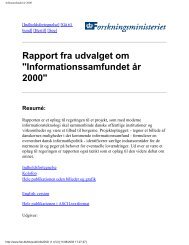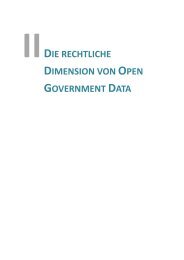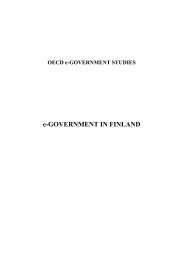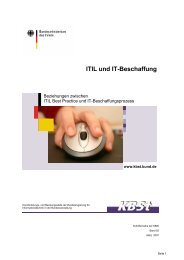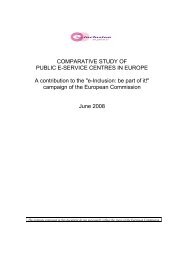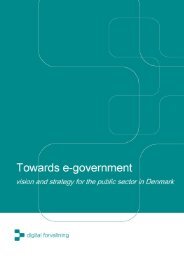1996.07.24 - From Corfu to Dublin - ePractice.eu
1996.07.24 - From Corfu to Dublin - ePractice.eu
1996.07.24 - From Corfu to Dublin - ePractice.eu
You also want an ePaper? Increase the reach of your titles
YUMPU automatically turns print PDFs into web optimized ePapers that Google loves.
Communication of the Commission<br />
<strong>to</strong> the Council, the European Parliament, the Economic<br />
and Social Committee and the Committee of the Regions.<br />
on<br />
The Information Society: <strong>From</strong> <strong>Corfu</strong> <strong>to</strong> <strong>Dublin</strong><br />
The new emerging priorities<br />
1. The principle of an Information Society Council was established by the <strong>Corfu</strong> Summit 24/25<br />
June 1994 on the basis of the conclusions of the Bangemann report "Europe and the global<br />
information society". The Summit considered "that the importance and complexity of the<br />
issues raised by the new information society justify the setting up of a permanent coordination<br />
instrument...with a view inter alia <strong>to</strong> ensuring a co-ordinated approach in<br />
the Council." The <strong>Corfu</strong> Council invited the Commission <strong>to</strong> set up an Action Plan covering<br />
the measures needed at Community level.<br />
The Action Plan - adopted on 19 July 1994 and entitled "Europe's way <strong>to</strong> the Information<br />
Society" - was discussed in the first Information Society Council on 28 September 1994.<br />
The Council invited the Commission <strong>to</strong> take up a number of measures in fields outlined in the<br />
Action Plan. The guidance given by the Council provided in particular an important impulse<br />
<strong>to</strong>wards the liberalisation of telecommunications.<br />
The Action Plan has successfully established a first framework for the European Union<br />
information society policy. On this basis, good progress has been made over the past two<br />
years:<br />
- As regards the legislative framework, the Commission has presented a complete<br />
reform package leading <strong>to</strong> full liberalisation in telecommunications by 1st of January<br />
1998. The fourth Framework Programme on research and technological<br />
development is succesfully being implemented and it incorporates three specific<br />
programmes related <strong>to</strong> information and communication technologies. Several<br />
measures aimed at increased awareness building have been launched. The G7<br />
Conferences held in Brussels in February 1995 and in South Africa in May 1996<br />
also contributed <strong>to</strong> raising awareness.<br />
- Most of the measures outlined in the Action Plan have either been realised or are<br />
being launched. However, some actions are pending as their preparation takes more<br />
time than expected, e.g. information security.<br />
- Valuable experience has been gained in the process of the implemention of the<br />
Action Plan. The Commission has now a more comprehensive picture of the<br />
measures necessary <strong>to</strong> achieve the objectives of its information society policy. In<br />
addition new questions and issues have emerged. It is therefore time <strong>to</strong> review the<br />
Page 1
Action Plan in order <strong>to</strong> give the information society a new political impetus. This is<br />
the objective of the Inforrmation Society Council on 8 Oc<strong>to</strong>ber 1996.<br />
2. Four main policy lines have been identified as priorities of equal importance:.<br />
(i) Improving the Business environment<br />
European businesses have started <strong>to</strong> adapt <strong>to</strong> the increasing competitive pressure and <strong>to</strong><br />
grasp the enormous opportunities of the information society. But for this difficult exercise<br />
they need a favourable business environment. This means in particular that full<br />
telecommunication liberalisation must be effectively implemented throughout the European<br />
Union by the 1st of January 1998. It also means that increased transparency and<br />
consistency of national regulation related <strong>to</strong> information society services is needed <strong>to</strong> ensure<br />
fair competition and the functioning of the internal market. Finally, more attention needs <strong>to</strong><br />
be given <strong>to</strong> the speedy take-up of information and communication technologies by the<br />
various sec<strong>to</strong>rs of the economy including SMEs.<br />
(ii) Investing in the future<br />
The information society means a knowledge-based society. In order <strong>to</strong> enhance Europe's<br />
knowledge-base, information society related research should have a key role in the 5th<br />
Framework Programme as stated in the first orientations that the Commission adopted on<br />
10 July 1996. The Commission will elaborate appropriate measures <strong>to</strong> respond <strong>to</strong> the<br />
invitation of the European Summit at Florence "<strong>to</strong> rapidly work out an action plan on the<br />
initiative 'Learning in the Information Society".<br />
(iii) People at the centre<br />
Putting people at the centre of the information society policy is a Commission priority, i.e. <strong>to</strong><br />
respond better <strong>to</strong> their expectations and concerns on issues such as access <strong>to</strong> a wide range<br />
of services and content. In practice the Commission intends <strong>to</strong> advance <strong>to</strong>wards a closer<br />
integration of Structural Funds and the information society policies <strong>to</strong> address social<br />
questions, <strong>to</strong> protect consumer interests and <strong>to</strong> improve the quality of public sec<strong>to</strong>r services.<br />
(iv) Meeting the global challenge<br />
Increasing globalisation means effort should be put on defining global rules. The Commission<br />
considers the completion of the WTO negotiations highly important in this respect. An<br />
information society of a truly global nature means increasing collaboration with our<br />
neighbours and helping integrate the developing world <strong>to</strong> the information society of the 21st<br />
century.<br />
Page 2
3. The Commission hereby submits the following documents <strong>to</strong> begin responding <strong>to</strong> some of<br />
these new political priorities:<br />
(i) A Communication on "The implications of Information Society on European Union<br />
Policies - Preparing the Next Steps". This is of particular political importance as it lays<br />
the foundation for adapting the Action Plan which the Commission will carry out by the end<br />
of this year in order <strong>to</strong> take in<strong>to</strong> account new strategic priorities.<br />
(ii) A Green Paper on "Living and Working in the Information Society: People first"<br />
which is intended <strong>to</strong> deepen the political, social and civil dialogue on the most important<br />
social and societal aspects of the information society.<br />
(iii) A Communication on "Standardisation in the Information Society" examines how, in<br />
the light of the characteristics of the ICT market and the ICT standardisation process, the<br />
best possible conditions can be created for the drawing up of the standards needed for the<br />
implementation of the information society.<br />
(iv) A draft directive on "Regula<strong>to</strong>ry Transparency in the Internal Market for<br />
Information Society services" which sets up an information mechanism on legislative<br />
initiatives of the Member States.<br />
4. The Commission invites the Council, the European Parliament, the Economic and Social<br />
Committee and the Committee of the Regions <strong>to</strong> give their opinion on these key policy<br />
orientations in order <strong>to</strong> prepare a revised Action Plan in time for the <strong>Dublin</strong> European<br />
Council.<br />
Page 3


